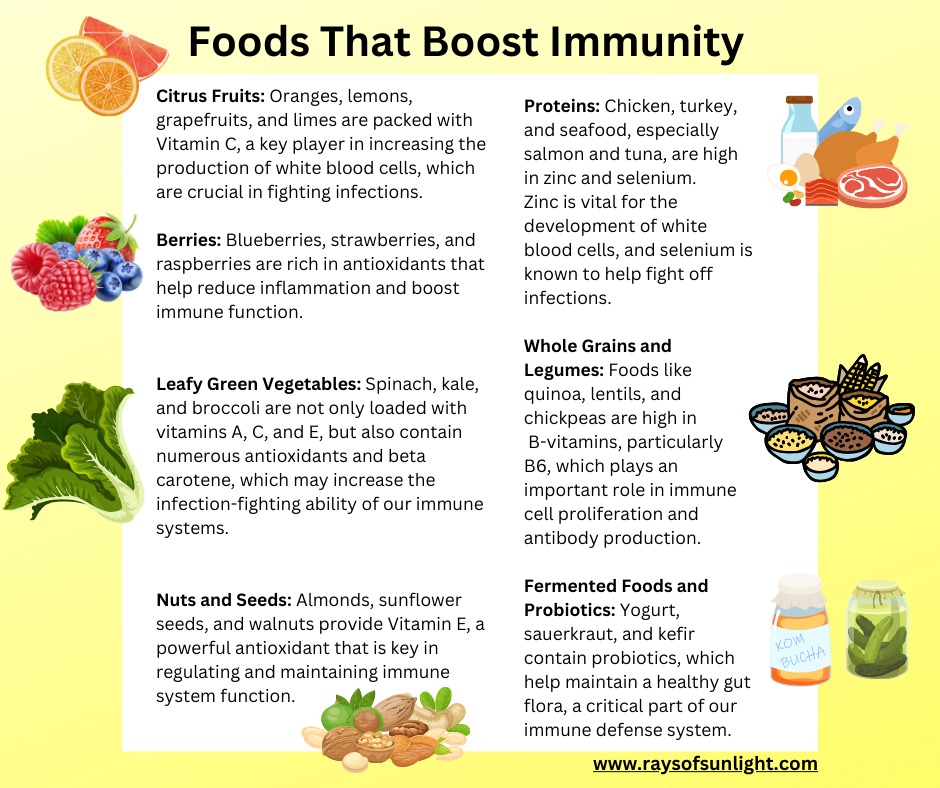In a world where we’re constantly exposed to various health challenges, from seasonal colds to global pandemics, the importance of a strong immune system can’t be overstated. But boosting your immunity doesn’t have to involve complex strategies or drastic lifestyle changes. In fact, simple, everyday actions can significantly strengthen your body’s natural defenses.
In this post, we’ll explore practical and accessible ways to boost your immunity. Whether it’s through the foods you eat, the way you manage stress, or your daily exercise routine, there are numerous steps you can take to help your body fight off infections and diseases more effectively. Let’s dive into the world of immune health and discover how you can make small changes for a stronger, healthier you.
Understanding the Immune System
Imagine your body as a fortress. Just like a fortress needs walls and soldiers to keep it safe, your body has its own defense system to protect against germs like bacteria and viruses. This defense system is known as the immune system. It’s made up of a network of cells, tissues, and organs that work together to defend your body. When germs invade, it’s the immune system’s job to recognize them as outsiders and fight them off.
Get insights from experts at Johns Hopkins Medicine on the intricacies of the immune system’s functions and its importance in maintaining well-being Explore the Immune System.
 How Does the Immune System Work?
How Does the Immune System Work?
The immune system’s first line of defense is barriers like your skin and the mucus in your nose, which try to stop germs from entering your body. If germs get past these barriers, your immune system kicks into higher gear. White blood cells, also known as leukocytes, come to the rescue. They hunt down the germs and destroy them. Think of white blood cells as the body’s soldiers, always ready to battle invaders.
What Weakens the Immune System?
While our immune system is usually great at protecting us, certain things can weaken it. Here are a few:
Poor Nutrition: Just like a soldier needs good food to fight, your immune system needs the right nutrients. A diet lacking in essential vitamins and minerals can weaken it.
Lack of Sleep: Not getting enough sleep is like having tired soldiers who can’t fight effectively. Your immune system needs rest to work at its best.
Stress: Constant stress is like sending false alarms to your immune system. Over time, this can tire it out, making it less effective.
Lack of Exercise: Regular exercise keeps your immune system fit and strong. Without it, your immune system can become sluggish.
Smoking and Excessive Alcohol: These habits are like enemies to your immune system, attacking and weakening it.
Certain Medications: Some medications, while necessary for other health issues, can also affect how well your immune system works.
Remember, taking care of your immune system is a lot like taking care of your overall health. The better you treat your body, the stronger your immune becomes. In the next sections, we’ll explore how to strengthen your immune system with healthy habits.
Nutrition and Boosting Your Immune System 
Just like a car needs the right fuel to run smoothly, your immune system needs the right nutrients to function properly. Eating a balanced diet is crucial for keeping your immune system strong and ready to fight off infections. Let’s break down what this means and which nutrients are particularly important for your immune health.
Why Balanced Nutrition Matters
A balanced diet includes a variety of foods that give your body the nutrients it needs. These nutrients help your immune cells function and respond quickly to challenges. Imagine each type of nutrient as a different tool your immune system uses to stay strong.
Key Nutrients for Immunity
Vitamin C: This is like the immune system’s booster. It helps immune cells work better and also helps your body produce important antibodies. Foods rich in Vitamin C include oranges, strawberries, bell peppers, and broccoli.
Vitamin D: Often known as the ‘sunshine vitamin’, Vitamin D is crucial for immune function. It helps our immune cells identify and attack bacteria and viruses. You can get Vitamin D from the sun, and it’s also found in foods like fatty fish, egg yolks, and fortified foods.
Zinc: This mineral is vital for immune cell development and communication. It plays a role in inflammatory response as well. Foods high in zinc include beef, oysters, beans, nuts, and whole grains.
Immune-Boosting Foods: “What Foods Boost Immunity?”
When it comes to bolstering your immune system, the foods you consume play a pivotal role. Let’s dive into some key foods known for their immune-boosting properties:
Each of these foods brings something special to the table, be it vitamins, antioxidants, or minerals, all of which are crucial in building a strong and responsive immune system. By incorporating a variety of these immune-boosting foods into your daily diet, you can create a powerful natural defense against illness. Remember, no single food is a silver bullet for immune health; it’s the synergy of a well-rounded diet that provides the best protection.
Check out the infographic above for a colourful and concise overview of these powerful foods. This handy graphic not only lists the foods but also briefly explains how each contributes to boosting your immunity.
To further support your immune system, focus on a diet rich in fruits, vegetables, whole grains, lean proteins, and healthy fats. Here are some easy ideas to incorporate these nutrients into your meals:
Breakfast: Start your day with a yogurt and fruit parfait, adding a sprinkle of nuts or seeds for extra nutrition.
Lunch: Have a salad with a variety of colourful veggies, and add a protein source like grilled chicken or chickpeas.
Snacks: Opt for fruits, vegetables, or a small handful of nuts for a nutritious boost.
Dinner: Include a protein and plenty of vegetables in your meal, along with a whole grain like brown rice or quinoa.
Remember, there’s no single food or nutrient that can ‘boost’ your immune system on its own. It’s the combination of a variety of nutritious foods that helps keep your immune system in top shape.
The Power of Hydration
Water is not just for quenching thirst; it plays a vital role in maintaining a healthy immune system. Staying hydrated is about giving your body the fluid it needs to carry out essential functions, which include supporting your immune system. Let’s dive into why hydration is so crucial and how it impacts your immunity.
Why Hydration is Key for Immunity:
Transporting Nutrients and Oxygen: Water helps carry oxygen to your body’s cells, which allows them to function properly. It also transports nutrients that support immune health throughout your body. Think of water as the delivery system that keeps your immune system supplied with what it needs.
Removing Toxins: Staying hydrated aids in flushing out toxins and waste products, which helps your immune system fight off infection. Your kidneys need enough water to remove waste from your blood effectively.
Keeping Mucous Membranes Moist: Adequate hydration keeps the mucous membranes in your nose and throat moist, which is important because these membranes trap germs and prevent them from entering your body.
Enhancing Digestive Health: Your digestive system needs water to function correctly. A healthy digestive system is crucial for a strong immune system, as a large part of your immune cells are located in your gut.
How to Stay Hydrated:
Drink Water Regularly: Aim for at least 8 glasses of water a day, but remember, needs can vary depending on factors like your age, activity level, and the climate you live in.
Include Foods with High Water Content: Fruits and vegetables like cucumbers, tomatoes, oranges, and watermelon can help keep you hydrated.
Monitor Your Hydration: Pay attention to signs of dehydration, like dark urine, dry mouth, and fatigue. These are signals that your body needs more water.
Staying hydrated is a simple yet effective way to support your immune health. It’s a fundamental part of your daily routine that can have a big impact on your overall well-being. So, remember to keep that water bottle handy and sip throughout the day!
Exercise and Immune Health
Regular physical activity is not just good for your muscles and mood; it also plays a significant role in bolstering your immune system. Let’s explore how exercise benefits your immune health and some tips to seamlessly integrate it into your daily routine.
How Exercise Boosts Immune Health:
 Improves Blood Circulation: Exercise helps blood flow more freely throughout your body, which means immune cells and substances can move more efficiently to where they’re needed.
Improves Blood Circulation: Exercise helps blood flow more freely throughout your body, which means immune cells and substances can move more efficiently to where they’re needed.
Reduces Stress Hormones: Physical activity lowers stress hormones like cortisol. Since chronic stress can weaken the immune system, reducing stress through exercise can help keep your immunity strong.
May Help Flush Bacteria: Breathing deeply during exercise may help flush bacteria out of the lungs and airways, reducing your chance of getting a cold, flu, or other illness.
Supports Overall Health: By helping to control weight, lower blood pressure, and strengthen the heart, exercise contributes to overall good health, which in turn supports a robust immune system.
Tips for Incorporating Exercise into Your Routine:
Find Activities You Enjoy: You’re more likely to stick to an exercise routine if you enjoy it. Whether it’s walking, cycling, yoga, or dancing, choose activities that you look forward to.
Set Realistic Goals: Start with achievable goals. If you’re new to exercise, begin with shorter, less intense sessions and gradually increase.
Make It a Habit: Try to exercise at the same time every day to establish a routine. Even 20-30 minutes a day can make a difference.
Mix It Up: Variety can keep your exercise routine fresh and exciting. Try different types of workouts to challenge different muscle groups and avoid boredom.
Stay Active Throughout the Day: In addition to dedicated exercise time, look for opportunities to be active throughout the day. Take the stairs, walk during phone calls, or do a quick stretching session during a break.
Listen to Your Body: It’s important to push yourself, but also to listen to your body. If you’re feeling unwell or overly fatigued, give yourself permission to take a rest day.
Exercise doesn’t have to be intense or time-consuming to be beneficial. Even moderate, regular physical activity can significantly enhance your immune function and overall health. So lace up those sneakers and get moving for a stronger, healthier you!
Sleep and Boosting Your Immunity
A good night’s sleep is more than just a way to feel rested — it’s a cornerstone of your boosting your immune health. Understanding how sleep and immunity are connected, and how to improve your sleep habits, can play a big role in maintaining your overall health.
The Link Between Sleep and a Strong Immune System:
Restorative Function: During sleep, your body repairs and regenerates tissues, builds bone and muscle, and strengthens the immune system.
Cytokine Production: Sleep encourages the production of cytokines, a type of protein that targets infection and inflammation, effectively creating an immune response.
T-Cell Function: Quality sleep enhances the effectiveness of T cells, which are white blood cells crucial for immune response.
Stress Reduction: Adequate sleep reduces stress, and lower stress levels improve immune function. Chronic sleep loss can activate the body’s stress response, weakening your immune system.
Tips for Better Sleep Habits:
Establish a Routine: Try to go to bed and wake up at the same time every day, even on weekends. Consistency reinforces your body’s sleep-wake cycle.
Create a Restful Environment: Make sure your bedroom is quiet, dark, and cool. Consider using earplugs, room-darkening shades, or a fan to create an environment conducive to sleep.
Limit Screen Time: The blue light emitted by phones, tablets, and computers can interfere with your ability to fall asleep. Try to avoid screens at least an hour before bed.
Be Mindful of Eating and Drinking: Avoid large meals, caffeine, and alcohol close to bedtime as they can disrupt sleep.
Relax and Unwind: Develop a bedtime ritual to tell your body it’s time to wind down. This could include reading, taking a warm bath, or practicing relaxation exercises.
Stay Active: Regular physical activity during the day can help you fall asleep more easily at night.
Manage Worries: Try to resolve your worries or concerns before bedtime. Jotting down what’s on your mind and setting it aside for tomorrow can be helpful.
Quality sleep is a powerful tool for maintaining immune health. By prioritizing and improving your sleep, you’re not only resting your body but also fortifying your immune defences.
This insightful article explains the vital connection between sleep and your body’s defense against illnesses. Dive into the science behind it and learn practical tips for a healthier sleep routine. Improve your immune health starting with a good night’s rest Explore the Article.
The impact of stress on immunity
Stress can significantly impact our immune system. When we’re stressed, our body produces more of the hormone cortisol. While cortisol is beneficial in short bursts, prolonged high levels can suppress the immune system, making us more susceptible to infections and illnesses. This is because cortisol can lower the production of lymphocytes, the white blood cells that help fight off infection. In a nutshell, the more stressed we are, the more vulnerable we become to colds, the flu, and other health issues.
 Luckily, there are effective stress-reduction techniques that can help mitigate these effects:
Luckily, there are effective stress-reduction techniques that can help mitigate these effects:
Meditation: This practice involves focusing your mind and eliminating the stream of jumbled thoughts that may be crowding your mind and causing stress. Meditation can instill a sense of calm, peace, and balance that benefits both your emotional well-being and your overall health. Mindfulness meditation, in particular, has been shown to reduce stress and boost immune function.
Deep Breathing Exercises: Deep breathing is a simple, yet powerful, relaxation technique. It’s easy to learn, can be practiced almost anywhere, and provides a quick way to get your stress levels in check. Deep breathing is the cornerstone of many other relaxation practices, too, and can be combined with other relaxing elements such as aromatherapy and music.
Check out this short video for a guided Deep breathing method that you can Watch the Video Here.
Both meditation and deep breathing exercises are tools that help your body to slow down, calming the mind and reducing the production of stress hormones. By incorporating these practices into your daily routine, you can enhance your body’s natural immune response and create a more resilient state of health and well-being.
Discover practical tips and techniques to manage stress and improve your overall well-being that can help you lead a more balanced and fulfilling life here: Explore Stress Relief Strategies.
Remember, it’s also important to combine these techniques with other healthy lifestyle choices, such as a balanced diet, regular exercise, and adequate sleep, to support your immune system and overall health.
Hygiene Practices
Maintaining good hygiene is a cornerstone of supporting immune health. Here are key practices:
Handwashing: This basic step is one of the most effective ways to prevent the spread of germs and protect your immune system. Regular handwashing with soap and water can significantly reduce the likelihood of catching infections such as the common cold or flu. It’s particularly important to wash your hands before eating, after using the restroom, and when you return home from public places. If soap and water aren’t available, a hand sanitizer with at least 60% alcohol is a good alternative.
your immune system. Regular handwashing with soap and water can significantly reduce the likelihood of catching infections such as the common cold or flu. It’s particularly important to wash your hands before eating, after using the restroom, and when you return home from public places. If soap and water aren’t available, a hand sanitizer with at least 60% alcohol is a good alternative.
Maintaining a Clean Environment: Regularly cleaning and disinfecting your home, especially high-touch surfaces, can help reduce the spread of germs.
Practicing Good Respiratory Hygiene: This includes covering your mouth and nose with your elbow or a tissue when coughing or sneezing. Proper disposal of tissues and following it up with handwashing can further reduce the risk of spreading infections.
Avoiding Close Contact with Sick Individuals: Keeping a safe distance from those who are unwell helps minimize your exposure to infectious agents.
By focusing on these hygiene practices, you contribute significantly to a strong and healthy immune system. These simple, yet effective habits are key to preventing the spread of illnesses and keeping yourself and your community healthy.
Avoiding Harmful Habits
Avoiding harmful habits is crucial for maintaining a strong immune system. Here’s how certain behaviors can weaken our immune defenses:
Smoking: Cigarette smoke contains thousands of harmful chemicals, some of which can interfere with the growth and function of immune cells, like cytokines, T cells, and B cells. This impairment can lead to an increased risk of infections, such as bronchitis and pneumonia, and it can also reduce the immune system’s effectiveness in fighting off cancer cells. Furthermore, the harmful substances in tobacco can cause inflammation, further weakening the immune system.
Excessive Alcohol Consumption: While moderate alcohol use might not significantly impair the immune system, excessive drinking can lead to immune deficiency, making the body more susceptible to infections. Alcohol can alter the function of the immune cells and slow down the response to pathogens. It can also disrupt the gut barrier, allowing more bacteria to pass into the blood, which can lead to complications like liver disease and increased susceptibility to infections.
Other Harmful Habits: This includes inadequate sleep, poor diet, and lack of exercise. Sleep deprivation can reduce the production of protective cytokines and infection-fighting antibodies, making the body more prone to illnesses. A diet lacking in essential nutrients can impair the production and activity of immune cells and antibodies. Regular physical activity, conversely, helps to boost the immune system by improving blood circulation, which allows immune cells and substances to move through the body more freely and do their job more effectively.
By avoiding smoking, limiting alcohol consumption, getting adequate sleep, eating a balanced diet, and engaging in regular physical activity, you can support your immune system and enhance its ability to fight off infections and diseases. This holistic approach to health is essential for maintaining a robust immune response and overall well-being.
When to Seek Medical Advice and Embracing a Holistic Approach
When it comes to health, particularly the immune system, understanding when to seek medical advice is crucial. While general tips can be beneficial, they are not a substitute for professional healthcare guidance, which may include both conventional and alternative medicine perspectives.
Personalized Advice: Every individual’s health needs and concerns are unique, influenced by factors like age, existing health conditions, lifestyle, and genetic predispositions. It’s important to seek advice from healthcare professionals who can provide a tailored approach. This may include consultations with both conventional medical doctors and naturopathic practitioners, offering a holistic view of the best practices for boosting your immune system.
Recurring Illnesses: Frequent sickness can indicate that your immune system may not be functioning optimally. Persistent or recurrent infections warrant a visit to a healthcare provider. This could be a conventional doctor or a naturopathic physician, depending on your preference and the nature of the illness. They can help identify underlying issues and suggest a range of treatment options, from traditional medicine to alternative therapies.
Immune Disorders: Various immune disorders require professional attention. Whether it’s an autoimmune disease or an immunodeficiency disorder, seeking advice from both the conventional medical field and the naturopathic community can provide a comprehensive understanding of your condition. Symptoms like prolonged fatigue, frequent infections, and delayed wound healing should be addressed through a collaborative approach that considers all aspects of health and wellness.
In every case, the key is to consult with healthcare professionals who respect both conventional and alternative medicine approaches. This ensures that you receive guidance that is not only scientifically sound but also aligns with your personal beliefs and preferences in healthcare.
How Can I Boost My Immune System Quickly?
Quick Immune Boosts
Looking to give your immune system a quick boost? It’s easier than you might think! Here are some practical, immediate steps you can take:
Getting Enough Sleep: Never underestimate the power of a good night’s rest. Sleep rejuvenates your body and is essential for a healthy immune system. Aim for 7-9 hours of quality sleep each night to allow your body to repair and regenerate.
Stay Hydrated: Drinking plenty of water isn’t just good for your skin and digestion; it’s crucial for your immune health too. Water helps in the production of lymph, which carries white blood cells and other immune system cells. Try to drink at least 8-10 glasses of water a day.
Engage in Moderate Exercise: Regular, moderate exercise like brisk walking, cycling, or yoga can help boost your immune system by improving circulation and reducing stress.
Manage Stress: Chronic stress can weaken your immune system, so it’s important to find ways to unwind. Practices like meditation, deep breathing, or engaging in hobbies can help keep stress in check.
Consume Immune-Boosting Foods: Certain foods can give your immune system a quick leg-up. Foods high in Vitamin C (like oranges, strawberries, and bell peppers) and Zinc (like nuts, seeds, and seafood) are great for an immediate immune boost.
By incorporating these simple yet effective strategies into your daily routine, you can give your immune system the quick boost it needs to keep you healthy and resilient. Remember, these are not just one-off tips but habits worth adopting for long-term health and well-being.
Conclusion
In closing, boosting your immune system isn’t about making drastic changes overnight. It’s about taking small, manageable steps that lead to lasting improvements in your health.
Are you ready to take action and strengthen your body’s defenses? Join our community of health enthusiasts and stay updated with the latest insights, tips, and strategies for a robust immune system. Follow us for regular updates and connect with like-minded individuals on the path to better health. Together, we can achieve stronger immunity and a healthier future. Start your journey today!
While our new article offers comprehensive strategies for boosting immunity, our previously published piece delves deeper into the intricate relationship between stress management, gut health, and overall well-being. Read the Article Here
Explore More on Your Journey to Personal Growth and Well-Being: 📚 👓
if you have enjoyed this post… Please send me some love…share, like and comment ❤️
Connect with Me!
For daily doses of inspiration, heartfelt stories, and game-changing wellness strategies, make sure to stay connected.
Natalie Fletcher
Visit my website: RaysofSunlight
Follow me on Facebook: Natalie Fletcher
True Balance Nanaimo: Facebook Page
Connect with me: Linktree
Reach out via Email: 8TrueBalance@gmail.com
Ready to level up your life, both in wellness and wealth? Let’s start this transformative journey together!
Discover more from TrueBalance
Subscribe to get the latest posts sent to your email.





